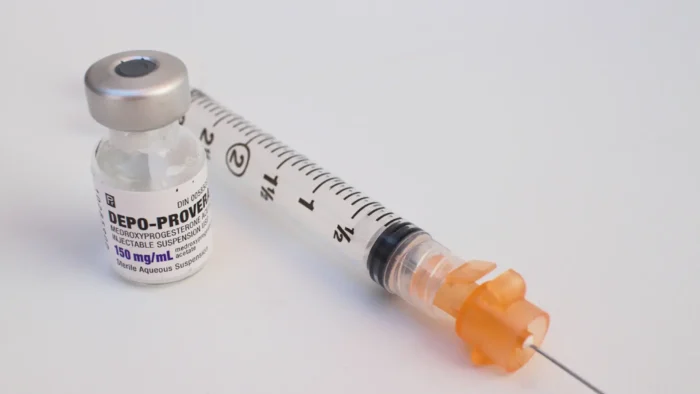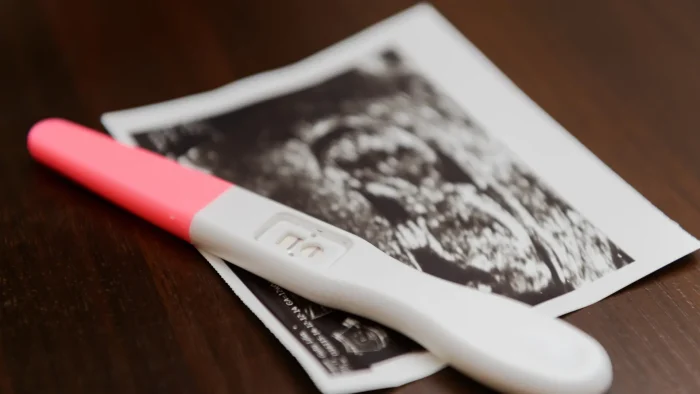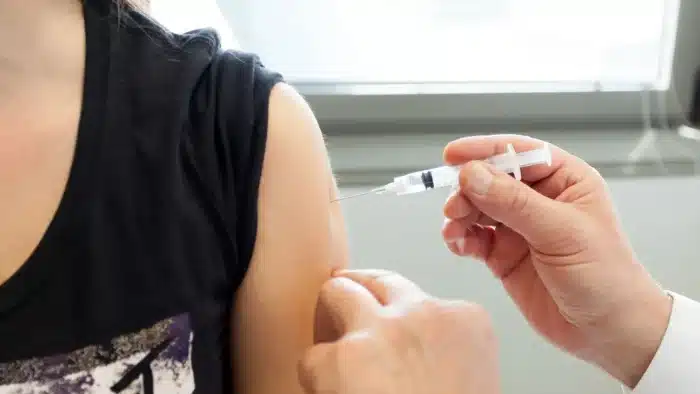
Injectable contraception is a widely used method of birth control, with a typical-use failure rate of 4% and a perfect-use failure rate of less than 1%. In 2013, the worldwide prevalence of injectable contraceptive use among partnered women was 4.1%, increasing to 10.5% in the least developed countries.
Depo-Provera, a well-known brand name for medroxyprogesterone acetate, is a contraceptive injection containing the hormone progestin. Administered every three months, Depo-Provera works by suppressing ovulation.
In this article, we will explore the effectiveness of Depo-Provera and discuss the chances of still getting pregnant while using this form of birth control.
Key Takeaways
- Depo Provera is a highly effective contraceptive method when used correctly.
- The mechanism of action involves suppressing ovulation, thickening cervical mucus, and thinning the uterine lining.
- Factors such as timely injections and patient adherence can influence its effectiveness.
- If a Depo Provera injection is missed, it’s essential to consult a healthcare provider for guidance.
- Expert opinions and clinical studies support the reliability of Depo Provera as a contraceptive method.
About: DoctorMedica is your trusted supplier of top-quality dermal fillers, viscosupplements, and more for your medical practice. We offer genuine products from leading brands at the lowest prices in the market. If you’re looking to buy Depo Provera wholesale for your practice, the sales representatives at Doctor Medica can give you guidance.
Understanding Depo Provera and Its Mechanism of Action
Depo Provera uses the hormone depot medroxyprogesterone acetate to prevent the ovaries from releasing eggs and to thicken cervical mucus, which blocks sperm from reaching an egg.
Receiving Depo Provera injections on time is crucial to maximizing their effectiveness. The first shot should be administered within the first seven days of a menstrual period or after confirming that pregnancy is not a concern. If an injection is late, backup birth control methods may be needed to maintain pregnancy prevention.
Adhering to a strict schedule of getting a Depo Provera shot every 12 weeks is essential for its efficacy. Missing scheduled injections can reduce its ability to prevent pregnancy. Consistent and timely injections are critical for maintaining its effectiveness.
Statistical Data on Depo Provera Effectiveness

Depo Provera has a 96% effectiveness rate in preventing pregnancy, meaning that out of every 100 women using it each year, about four may still get pregnant. Younger women, especially teenagers, often face a higher risk of unplanned pregnancies.
Nearly half of the women using Depo Provera for one year noticed that their periods stopped. This is part of how the contraceptive works and indicates its popularity among those seeking both menstrual cycle suppression and pregnancy prevention.
Depo Provera shows over 99% effectiveness with perfect use, meaning when taken exactly as directed, nearly no one gets pregnant. The key to maintaining its effectiveness is receiving the birth control shot every 12 weeks.
If the interval between shots exceeds 12 weeks, the chance of pregnancy increases slightly. Adhering to the recommended schedule makes Depo Provera a highly reliable form of birth control. It is important to consider how typical use compares and the factors that might affect these numbers.
| Contraceptive Method | Perfect Use Effectiveness | Typical Use Effectiveness |
| Depo Provera (Injection) | More than 99% | 96% |
| Intrauterine Device (IUD) | More than 99% | >99% |
| Implants | More than 99% | >99% |
| Oral Contraceptive Pills | 99% | 91% |
| Condoms | 98% | 85% |
Factors Affecting Depo Provera Effectiveness

Getting your Depo Provera shot every 12 weeks is critical for effective pregnancy prevention. If you wait too long for the next shot, its effectiveness decreases, and you may need additional birth control methods or emergency contraception. Keeping track of your next shot date is essential.
Certain medications can make Depo Provera less effective. For example, antibiotics, some HIV medications, seizure drugs, and herbal products like St. John’s Wort can reduce its ability to prevent pregnancy. If you’re taking other medications, consult with a doctor about potential interactions with your birth control shot. You can also discuss Depo Provera’s side effects to prepare yourself better for this treatment.
Depo Provera is not suitable for women with certain health conditions, such as liver disease, breast cancer, lupus, heart disease, or a history of stroke, as these conditions may interact poorly with the medication. It’s also not recommended for those with unexplained vaginal bleeding.
Doctors need to know all their patients’ medications to ensure the shot’s effectiveness is not compromised. Being aware of these factors helps maintain the reliability of Depo Provera as a contraceptive method.
What to Do If You Miss a Depo Provera Injection
Depo Provera is a birth control method that needs a shot every 12 weeks. If a shot is late, the chance of getting pregnant increases.
- Check how many days late the injection is.
- If less than two weeks have passed, get the shot as soon as possible.
- For delays longer than two weeks, use backup birth control right away.
- Consider emergency contraception if you had unprotected sex in the last few days.
- Schedule an appointment with a healthcare provider for advice.
- Keep using another form of birth control until the next Depo Provera shot can be given.
- Mark your calendar or set reminders to avoid missing future injections.
Knowing the pregnancy risk is key after looking at what to do if you miss a Depo Provera shot. Late shots can boost your chances of getting pregnant. The shot works best if you get it every 12 weeks. If you’re late, this protection drops. You might need extra birth control or emergency help to prevent pregnancy.
It is vital to contact a healthcare provider for guidance. They can help decide the best start time for using Depo Provera, discuss its risks and benefits, and learn about other birth control options.
Expert Opinions and Clinical Studies on Depo Provera Effectiveness

Healthcare professionals highlight that Depo Provera, a contraceptive injection, is more than 99% effective with perfect use. They emphasize the importance of receiving this birth control shot every 12 weeks to maintain its reliability.
While options like IUDs and implants may offer higher effectiveness, Depo Provera remains a highly successful method for preventing pregnancy among various birth control options.
Doctors also note that while Depo Provera effectively prevents pregnancy, it does not protect against STDs. Therefore, they recommend using condoms in conjunction with the shot for comprehensive reproductive health protection.
A common misconception is that Depo Provera makes it challenging to get pregnant after stopping the shot. However, while fertility may take some time to return, Depo Provera does not cause long-term infertility. Studies show that within ten months after the last injection, 50% of women who wish to conceive can do so.
Another myth is that Depo Provera leads to miscarriages and congenital disabilities. Research indicates this is not true. Using DMPA does not increase the risk of miscarriage or birth defects.
Clinical studies demonstrate that Depo Provera CI has a failure rate of less than 1% with perfect use, underscoring its reliability as a contraceptive method.
Conclusion
Depo Provera is good at preventing pregnancy, with up to 99% effectiveness if used ideally. Still, there’s a slight chance of getting pregnant, especially if shots are late or missed.
Other medicines can also make it less effective. Sticking to the schedule every 12 weeks is critical for those using Depo Provera. Always talk with a health expert for the best advice on using this birth control method correctly.
FAQs
1. What is Depo Provera, and how effective is it?
Depo Provera is a type of birth control shot that, when used correctly, has a high effectiveness rate in preventing pregnancy.
2. Can you still get pregnant while using Depo Provera?
While the chances are pretty slim, there’s always a possibility of getting pregnant even when using any form of birth control, including Depo Provera.
3. Are there factors that can reduce the effectiveness of Depo Provera?
Certain factors, like not getting your shots on time or taking certain medications, can lower efficiency.
4. How soon after stopping Depo Provera can one get pregnant?
It varies from person to person, but generally, fertility may return anywhere between 10 months to over a year after your last shot.
References
Wolfe, K., Cansino, C. Injectable Contraception: Current Practices and Future Trends. Curr Obstet Gynecol Rep 4, 26–36 (2015). https://doi.org/10.1007/s13669-014-0106-7
Wexler, P. (Ed.). (2020). Methemoglobinemia. In J. H. Jones & R. A. Erickson (Eds.), Hazardous Substances Data Bank (2002). National Center for Biotechnology Information. https://www.ncbi.nlm.nih.gov/books/NBK559192
Cleveland Clinic. (n.d.). Depo-Provera (birth control shot). Retrieved from https://my.clevelandclinic.org/health/drugs/4086-depo-provera-birth-control-shot
Related Articles
Joanna Carr
Mounjaro Indications – Type 2 Diabetes and Chronic Weight Management
Understand Mounjaro’s approved indications for type 2 diabetes and chronic weight management, supported by clinical trial data and FDA guidance.
Joanna Carr
Biorepeel Ingredients – Which Acids Make Up This Chemical Peel?
The primary acids in Biorepeel include trichloroacetic acid (TCA), salicylic acid, lactic acid, and citric acid.
Doctor Medica team
Hyalgan vs Euflexxa: Analyzing Differences in Joint Therapy
Hyalgan and Euflexxa are both viscosupplements used for the treatment of knee osteoarthritis. Read our comprehensive comparison.


